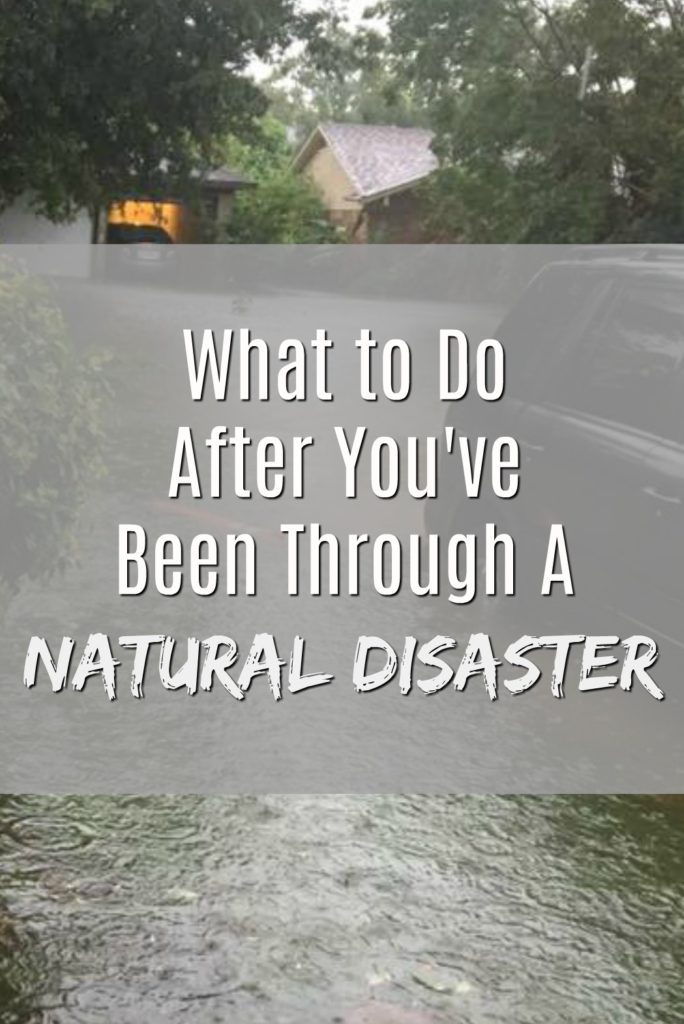One moment I was happily running one of my usual routes and just hours later I was one of the “flooded”. On August 25th 2017 Hurricane Harvey arrived in my area of Texas. For two days life went on as it usually did during hurricanes and tropical storms in our area. We bought some shelf stable food. There were plenty of water bottles around. I felt as though we would make it through just like any other storm. We would be inconvenienced, maybe bored. Power might be down. We actually got together with some friends the second day of the storm and the children played and the adults chatted without a worry. That night I went for a run and then easily fell into a peaceful sleep. Several hours later my husband called me from our garage and told me to come to him. I was shocked to see our entire garage filled with water. My stomach dropped. He said, “we only have one more inch before it gets in the house”. That inch seemed to come in a matter of moments and suddenly the water was seeping into our house from many angles.
Soon we were a rush gathering any low lying belongings and putting them up on shelves and countertops. We worked as a team to lift our newer furniture and appliances onto paint cans and buckets in hopes they would be high enough to avoid damage from the water. Messages were coming and going from my phone as rapidly as the water was rising. A plan was made to go to a friend’s house nearby with our pets and what we could carry on our backs. Hurricane Harvey dumped 50 inches of rain over our city and this time we were one of many the unfortunates who had to deal with the aftermath of a great flood.
During this time, staying focused on my physical health had to take a backseat position the flood damage. However, taking care of my mental health and stress level was vital to coping with this hardship and not having it take a physical toll on my body as well. I am going to share with you some tips that helped me healthily make it through this disaster.

-
Let Yourself Talk About It
Many of my friends and family were concerned for our well-being and reached out to me after the flood. Taking time to talk with them about what happened, and how we planned to manage the situation helped process the feelings of frustration and sadness. Likewise, there were many people in our community that suffered from the storm as well. Speaking with them about their experiences was a helpful reminder that I wasn’t in this alone and we would come together during this ordeal.
-
Limit Viewing of Disaster Footage
When disaster strikes photos, videos, interviews, and social media posts are everywhere. While you will need to sift through important information, especially regarding safety, you should assign a time of day to do so and take a break from the media coverage for the remainder of the day. Watching or listening to coverage of the disaster upon waking up can set the tone for a stressful morning. A good night’s sleep can be interrupted if you are watching footage right before bed.
-
Take Care of Your Nutritional Needs
Keep yourself fed, try not to skip meals. Some people react to trauma by not eating. There could be a lot of physical work involved with rebuilding and you will need nourishment to manage the labor, as well as the mental stress. Even if you have a loss of appetite try to utilize protein shakes or nutritional bars to consume some calories several times through the day. It’s even more important that you consume enough water to stay hydrated so your body can function properly and you can hopefully avoid physical symptoms of anxiety and stress.
-
Rest, Even When You Don’t Feel Like You Should
When your home has been destroyed and there is a lot of clean up ahead you will feel like you are obligated to be on working 24/7. This is understandable. You will likely already be under a lot of stress and worry from the uncertainty you are facing. Assigning time to have a full night’s sleep or even a mid afternoon nap will have you better prepared to work efficiently. Don’t feel guilt for resting and utilize any and all available volunteers who offer to help you.
-
Take it One Day (or Hour) at a Time
Focus on the task at hand for that hour. Yes, you will need a game plan to try to efficiently make it through the aftermath and get back to your normal life. But this situation will be a marathon of days, not a sprint. Write your plans and put them into action same day, maybe up to 3 days out, however be ready for a change to occur at any time.
I had a great reminder from a friend that everything that happened to our home and losing our belongings during Hurricane Harvey was a hardship. However, we did not endure a tragedy as we were all alive and well and able to work to get back to a normal life. There were other families that were not so fortunate.
While I hope this experience would be a once in a lifetime occurrence, I do at least feel better prepared for how to react in the future should it happen again or to a dear friend or family member.
Have you lived through a natural disaster? What other advice would you add to this post?

|
I am a runner and fitness fanatic who is dedicated to living a healthy lifestyle 80% of the time. I live in Texas and divide my time between raising 3 children, teaching, and living a fit life. |



With thanks! Valuable information!